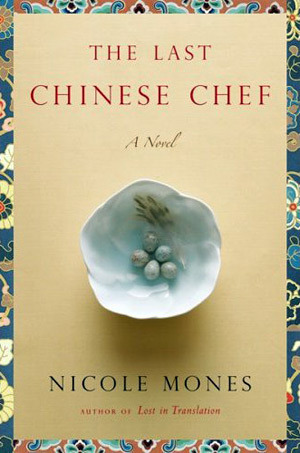I noticed this lovely title when perusing my local library during a Lost in Translation afterglow. I thought, what the hell, I trust this author now. Unfortunately, I frequently found myself forcing myself to stick with it. While the Lost In Translation was a wild ride to an exotic land, this one was as dry, banal, and stereotypical as a walk through a Chinatown souviner shop.
The book was about a food writing widow, Maggie, who finds that her husband may have sired a child during one of his business trips to China. She then travels to China to deliver a paternity test herself in order to deny the claim. Along the way she befriends a half Chinese-American man, Sam, that is trying to keep the spirit of his ancestry and Chinese cooking alive in an upcoming banquet competition.
The book falters technically when it comes to the ebb and flow of tensions. The three biggest tensions were 1) the results of the paternity test, 2) the results of the banquet competition and 3) the budding relationship between the Sam and Maggie. All three tensions resolved in the last two chapters of the book and occurred with quick succession. The third tension occurred almost as a consolation prize. Their friendship never hinted at sexuality, and the described event lacked chemistry. It just didn't fit. The book built up tension then let it simmer out. This is reminiscent of the end of Lost in Translation where they found out the dumb fate of Peking man in the last paragraph. This disappointment may simply be a feature of Nicole's Mones writing ability.
I also couldn't help questioning its depth. I kept on sniffing whiffs of phony-ness. She would hint at small quirks of characters as broad generalizations of Chinese culture. In this method, she implicitly made odd assumptions about American culture in comparison. That sounds oblique, but that is the best way I can summarize how phony it felt. There was a forced foreignness to it. For example, at one point Sam mentions, somehow condescendingly, that Maggie should take a shower. The bathroom is free because all Chinese women take showers at night. What does that mean? What does that imply? I think that it is supposed to imply that China is fantastically exotic. (Also, I take my showers at night so I had no idea where this was coming from) Another example was the translation of a Chinese expletive to "fornicators". Modern English has a VERY a similar expletive, but this awkward translation was a forced attempt at making their colloquialisms sound much more foreign. Needless to say, we should not mistake poor translations for mystique. These are only small examples to underline the overall uneasy tone of the book.
Where the book excels was its description of food and the effect of the Cultural revolution. It is a pity that the book did not focus on these things more. The food was only well featured in the final act during the banquet. The Culture revolution was just too big a topic to introduce in the final third of the book like she had. If it was only a mentioned to link the generations through its contrast with the feudal system described earlier in the book, then it was lost on me. Sorry, Nicole.


No comments:
Post a Comment